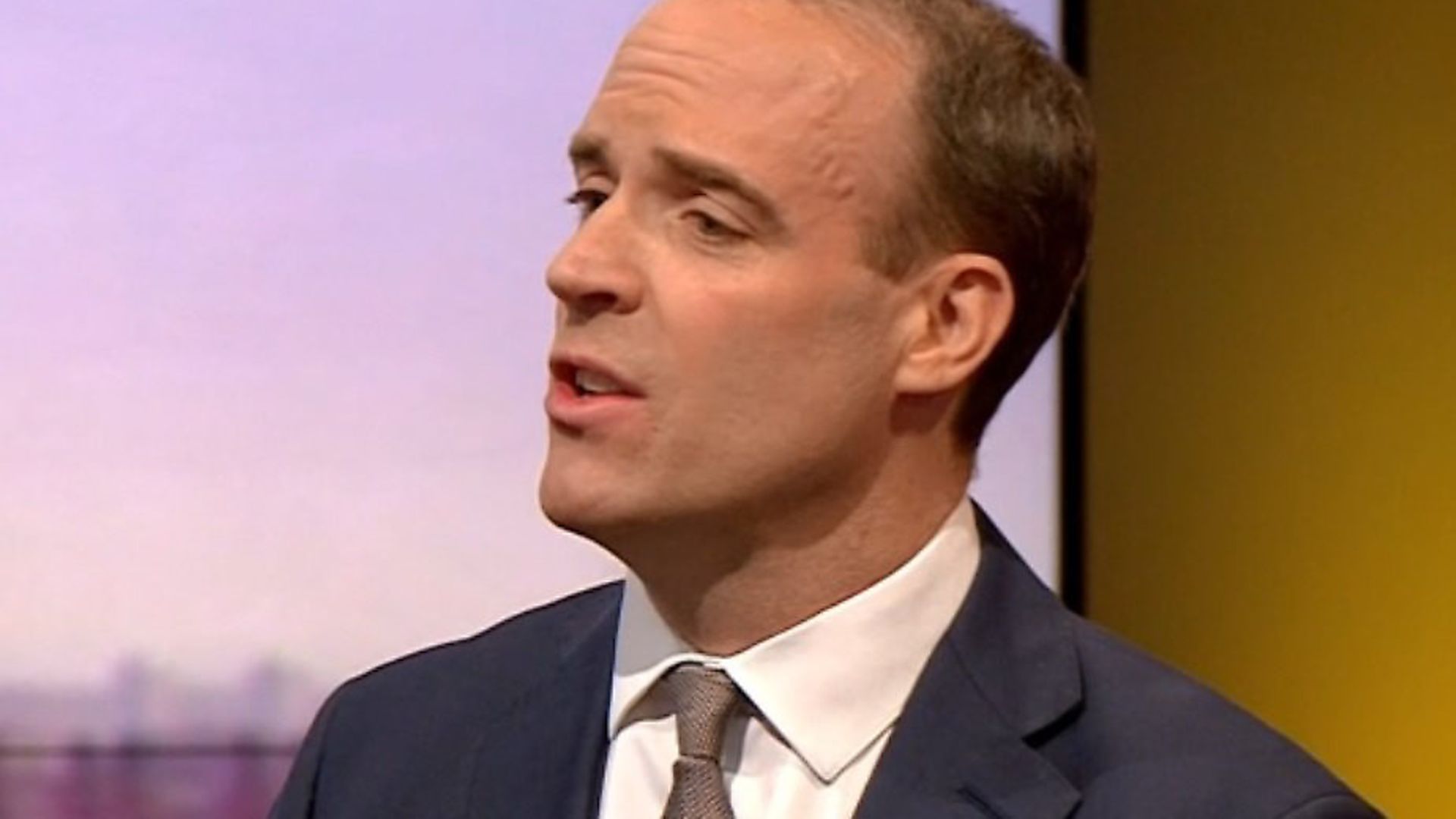
Dominic Raab has downplayed the prospect of the UK leaving the EU without a deal following the second phase of the Brexit process.
The foreign secretary initially declined to get into “hypothetical negotiating objectives” when asked if a no-deal would take place if the UK failed to secure its fishing objectives in trade talks.
But he later replied: “I don’t think it’s remotely likely”, when pressed further during an interview BBC One’s The Andrew Marr Show on whether the UK could leave without a deal.
Critics have warned a no-deal Brexit could still occur at the end of 2020 given the lack of time to negotiate the future relationship between the UK and EU.
Raab’s remarks came as both he and security minister Brandon Lewis were among the latest senior Tories to fail to explain the targeted migration levels under the party’s plans to cut immigration “overall”.
The Tories’ post-Brexit plans include requiring the “vast majority” of migrants to need a job offer to come to the UK to work, regardless of where they are from in the world.
The party said there would be a small number of exceptions, including high-skilled scientists and those who wanted to come to the UK to start a business.
On future Brexit talks, Raab said the UK was “not going to align ourselves to EU rules”.
In response to what would happen if the UK could not get what it wanted over fishing, Raab also said: “There’s going to be a negotiation, of course there are going to be compromises on all sides.”
Pressed if the UK would compromise on fishing, Raab told said: “No, no, we’re going to be an independent coastal state but we’ll take the best interests of the UK on board.
“We’re not going to be locked in to a set of EU rules which are targeted and tailored towards the best interests of the Europeans, and actually it’ll be a compromise.”
Asked if the UK would leave without a deal if it failed to secure its objectives on fishing, Raab replied: “I’m not going to be able to break down in advance the hypothetical negotiating scenarios.
“The guarantee I can give is we’re going to be an independent coastal state, we’ll have full control over it and we’ll do what’s in the best interests of fishermen and women up and down the country.”
Asked “could we leave without a deal?”, Raab said: “I think it’s, no, it’s not what we’re… I don’t think it’s remotely likely.”
Ministers have already made clear they are finally abandoning the party’s long-standing commitment to get net migration down below 100,000 a year – a target they have never met.
Raab insisted “we are not going to fix on an arbitrary target” when asked by how many the number will reduce by – a vow made also by Mr Lewis.
Asked about his party’s immigration proposals, Lewis told Sky News’s Sophy Ridge On Sunday: “Anybody who’s already here and is part of the EU settled status scheme, their rights are protected, they are absolutely clearly protected and in place.
“This will be for new people coming from the EU once we’ve left the European Union under a future immigration system.”
Last week, prime minister Boris Johnson said the Conservatives’ promised points-based immigration system “may” mean the numbers come down “in some sectors”, after home secretary Priti Patel had earlier said a Tory government would “reduce immigration overall”.
Announcing immigration plans, the party said access to benefits would be equalised between EU nationals and those from the rest of the world, meaning non-UK citizens would typically need to wait five years before they were able to claim benefits.
The party pointed out that under current rules, EU migrants can access welfare and services after being in the UK for three months.
A Tory government would also vow to put an end to the practice of child benefit being sent abroad to support children who do not live in the UK.
The party claims these two measures could save an estimated £800m a year by 2024-25.
Another measure to be introduced by the Tories would be an increase to the immigration health surcharge from £400 to £625.
The party said that under the current system, people on a work, study or family visa incur averaged NHS costs of £625 per year but only paid £400, and it said the change would raise more than £500m a year.
The party said there will be an “immediate cash injection of £20m this year” to strengthen borders and reduce illegal immigration, including new equipment to better detect illicit goods such as firearms and drugs.
Warning: Illegal string offset 'link_id' in /mnt/storage/stage/www/wp-includes/bookmark.php on line 357
Notice: Trying to get property 'link_id' of non-object in /mnt/storage/stage/www/wp-includes/bookmark.php on line 37






